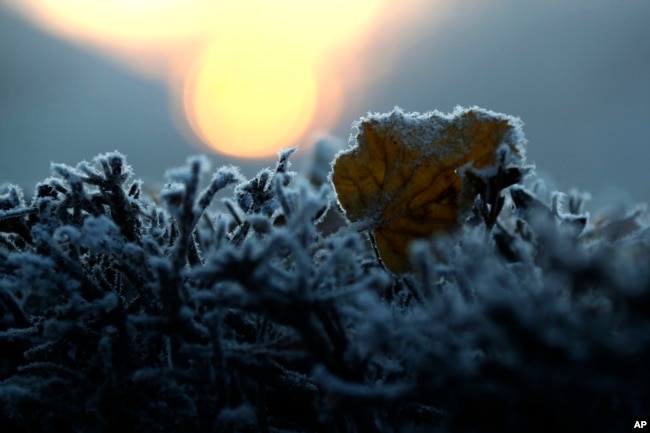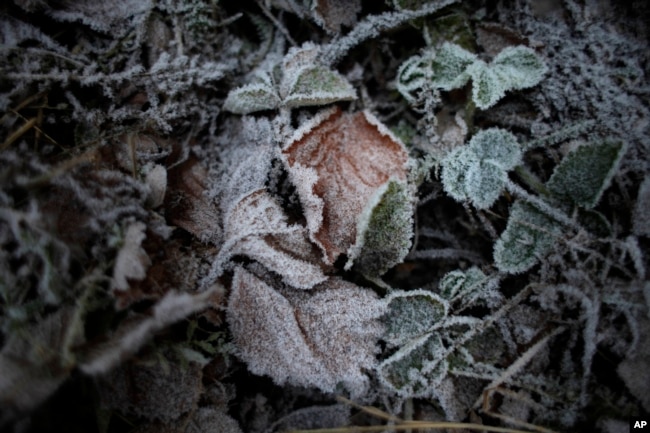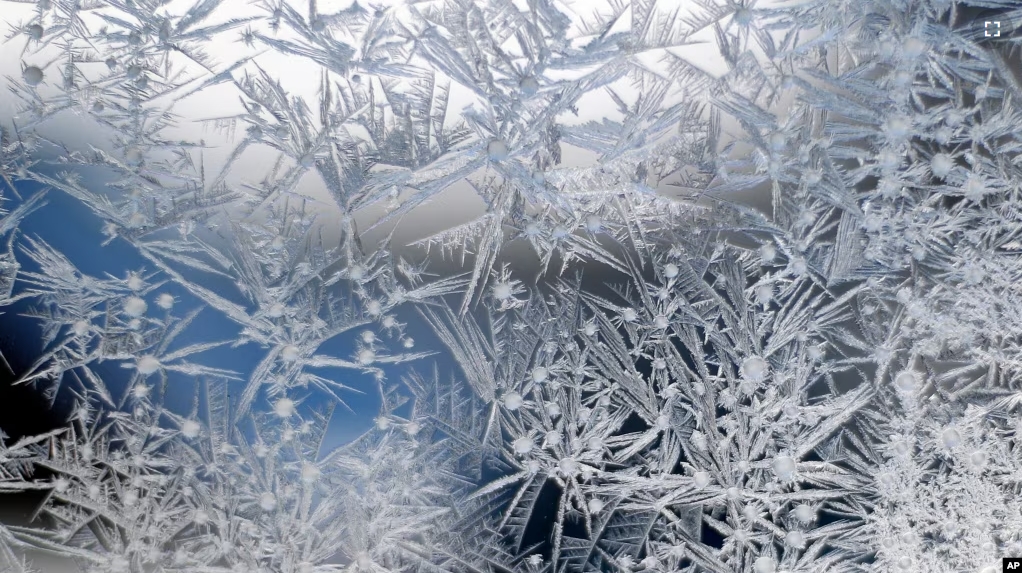Now, from VOA Learning English, it’s time for Words and Their Stories.
If this is your first time with us, this program explores words and expressions commonly used in American English. We take a look at where they come from and how best to use them.
So, as winter officially comes to half the world, today we celebrate an expression that means winter is coming.
When temperatures drop and a cold snap comes, that means one thing: Jack Frost has arrived!
Jack Frost represents the coming of dark, cold days. He is the personification of winter, a human form of winter weather. So, when we say, “Jack Frost is nipping at your nose,” we mean that you feel the cold, icy effects of winter on your face.

When a frost or deep freeze comes, you had better bundle up! You should wear enough clothing to stay warm.
Now, Jack Frost does, indeed, bring the cold of winter. But he can also create beauty in nature. Some traditions claim that Jack Frost is responsible for leaving ice and snow on windows, trees, the ground…anywhere it will stick.
While we know frost is a natural event, it is fun to think that an imaginary creature named Jack Frost (or another name in some other cultures) changed the world into a winter wonderland!
That is what poet Hannah Flagg Gould (1789-1865) must have been thinking when she wrote a poem called The Frost.
Here are parts of that poem.
THE FROST looked forth, one still, clear night,
And he said, “Now I shall be out of sight; …
Then he went to the mountain, and powdered its crest,
He climbed up the trees, and their boughs he dressed
With diamonds and pearls…

A conversation
With all of its beauty and extremes, winter is a great subject for songs and poetry. But now, let’s listen to how we use these wintry expressions in conversation:
Brrr! It is freezing outside. This cold snap came out of nowhere!
I don’t care how cold it is. I’m going on a hot date!
Is that all you’re wearing? You need to bundle up or Jack Frost will be nipping at more than your nose!
I’ll be fine. I’m wearing my new coat.
That it is NOT a winter coat. I mean, it looks great, but it’s much too thin. You will catch a cold. I know. You can wear my new down coat. It keeps you warm up to minus 30 degrees Celsius!
I’m going on a date…not exploring the Arctic Circle! Thanks. But I am not wearing that big, thick black coat. Besides, the taxi will take me from door-to-door.
But what if something goes wrong? What if the car skids on the ice and is involved in an accident? You’ll have to walk to the restaurant. You might freeze to death!
No, I won’t. I’ll just call an Uber to come and get me.
And what if that vehicle runs out of fuel? Then you’ll have to walk to get more.
No, the Uber driver will. I’ll just call another car.
What if that new Uber driver is a pregnant woman and she goes into labor? You’ll have to help. You’ll have to wait outside in the cold until help arrives! And the roads are already covered with five centimeters of snow! It could take the ambulance an hour to get to you! If you’re wearing that thin coat…you’ll catch your death!! The EMTs will find you frozen solid like a block of ice!!
Stop! Stop!! You win! Give me your coat!
Good decision.
Here’s my ride …
Don’t forget gloves…a hat…and a scarf! Okay, good bye. Have fun!
And that’s the end of this Words and Their Stories.
Until next time!
I’m Anna Matteo.
Anna Matteo wrote this story for VOA Learning English.
_______________________________________
Words in This Story
cold snap – n. a brief period of very cold weather
nip – v. to injure or make numb with cold
shiver – v. to shake slightly (as from cold or fear)
wonderland – n. an imaginary place of delicate beauty or magical charm
powdered – v. to sprinkle or cover with or as if with fine particles of something
bough – n. a branch of a tree
skid – v. to fail to grip the roadway
ambulance – n. a vehicle equipped for transporting the injured or sick
EMT – n. a person who is trained to provide emergency medical services to patients who are being taken to a hospital : short for Emergency Medical Technician
